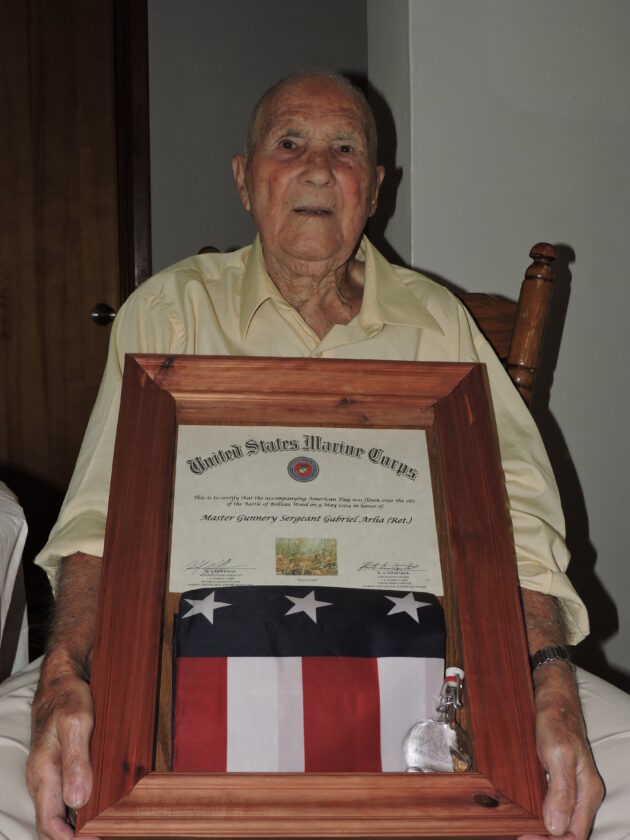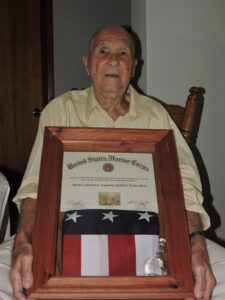A life dedicated to service
From earning his diploma to becoming a citizen, Weirton's Gabe Arlia says he would do it all over again

A ROLE MODEL — Gabe Arlia, a Weirton native and Follansbee resident, holds a framed certificate presented to him by Marine Corps Master Sgt. Cynthia Wolanski. A former member of the Tri-State Young Marines, she is one of many area youth Arlia has influenced through his leadership of the group. With the certificate is a glass flask containing water collected from a well at Belleau Wood, site of a major World War I battle. -- Warren Scott
WEIRTON — Weirton native and Follansbee resident Gabe Arlia has dedicated many of his 96 years to serving his country and community, from three years of service in the Marine Corps and 30 years in the Marine Corps Reserves to leading many area youth in a group designed to encourage patriotism and community service.
Arlia came to the U.S. from Italy when he was 8.
Accompanied by his mother and younger sister, they traveled by ship to meet his father, who had gotten jobs first at a textile mill and later, Weirton Steel.
“I was born 40 days after my dad left,” he said, noting his father came to America in hopes of establishing a more secure life for his family.
“In 1936, Italy was going to hell already,” said Arlia, who noted the nation was under the power of Benito Mussolini, a fascist, while German forces were invading many countries under Nazi dictator Adolph Hitler.
After landing at New York City, Arlia and his mother and sister took a train to Pittsburgh.
While aboard, he marveled at the sight of a porter, the first Black man he had encountered.
“My mother had never seen one either, but she knew there were such people,” said Arlia.
But after settling in Weirton, he soon found he, as an Italian immigrant, was in a minority group himself.
Once enrolled in school, he was placed in a classroom with children of immigrants from Italy, Greece and Poland so they could learn English.
“There also was an 18-year-old Czech girl who was there to learn English,” Arlia recalled.
“Mrs. Dorrance, Virginia Dorrance — God bless her — taught us to speak English one word at a time. She would hold up objects and identify them. That’s how she taught us,” he said.
Arlia added the patient teacher also enlisted a student who spoke English and Italian to aid her.
After entering school in December, he was able to speak and understand English when the school year ended in May.
When not in school, Arlia helped with the small farm his family established in the Kings Creek area.
There he milked a cow and fed goats, pigs and chickens each morning, said Arlia, who noted the family sold milk from the cow and a goat to bring in additional income.
At 12, he worked for a local bakery owned and run by a Greek family, making doughnuts and performing other tasks, and at 14, he was bartender for the Paramount Club, a bar frequented by many steelworkers who could cash their paychecks there.
While he was not legally permitted to serve alcohol, local police turned a blind eye to his presence, Arlia said.
He noted when the U.S. entered World War II, and many men enlisted in the military, he and other teens were able to get work at local industries.
“During the war, you could work at (age) 16,” he said, while admitting at 15, he lied about his age and got a job with the railroad, serving as a crossing watchman and inspecting the tracks for damage.
Arlia said he often worked nights while still attending school and he got sleep when he could.
From there, he went to Weirton Steel, serving in a labor gang and serving as a “fireman” for its crane crews.
Arlia explained the job involved firing a handful of coal-fueled cranes used at the steel mill.
He noted by 1945 and 1946, many men were returning from their service in the war and had been promised their jobs would be waiting for them, so he and other teens were let go.
For that reason, he decided to enlist himself at the age of 17 in 1946.
Arlia said he considered joining the Army or the Navy, but the recruiters for those branches were at lunch when he and a friend set out to enlist.
A poster depicting a Marine paratrooper and the uniform of the Marine Corps recruiter changed their minds.
“There was a real nice poster of a guy in a parachute, and a Marine Corps gunny (a nickname for gunnery sergeant) arrives in dress blues. Two days later, we’re in Cleveland getting physicals,” Arlia recalled.
He said they later learned Marine paratroopers were limited to reconnaissance missions by then.
Arlia and other new recruits were transported by train to South Carolina and boarded a ferry to Parris Island, where they were to undergo basic training.
Upon arrival, he and his friend encountered a drill sergeant who appeared to be 7 feet tall and told them they were late for training.
Arlia said he insisted they could not be late, as the train just got there, and received a sharp slap in the head from the officer.
“You learn what discipline’s about real quick,” he said.
Following basic training, Arlia was sent to Camp Pendleton in California.
There his immediate commanding officer was a first sergeant who had hailed from Dust Bowl-ravaged Oklahoma and found military service as an answer to his family’s poverty.
The officer was seeking a clerk-typist and Arlia had learned to type from a neighbor who planned to become a secretary.
Arlia said the sergeant didn’t hide his prejudice against troops who weren’t of the White Anglo-Saxon Protestant variety and referred to him alternately as “Harley” or “boy.”
He said discrimination wasn’t new to him, as he and other Italian-born children had been bullied by classmates.
He said with time, the first sergeant came to respect him for his attention to detail, but he had grown tired of the work.
One day, Arlia asked to join a reconnaissance, or “recon,” unit known for its hard-core manner.
The first sergeant warned, “They will push you until you die,” but Arlia insisted.
Once in the unit, Arlia was trained to perform various tasks, including setting and detonating explosives.
“I was 18 years old and a guy who blows things up,” he said.
Arlia noted it can involve great precision.
“You can make toothpicks out of a bridge or damage it just enough to be unusable,” he said.
Arlia hoped to serve in China but instead was sent to Dutch Harbor, Alaska.
The area was home to a booming fishing industry, but the Marines’ primary purpose was guarding old bunkers and ammunition dumps there.
During the war, U.S. troops had thwarted a Japanese invasion of the nearby Aleutian Islands and perhaps were concerned about its future security.
Arlia recalled finding the landscape dotted with many rubber “artillery pieces” that looked real from the sky.
“It looked like we were armed to the teeth, but they were really just decoys,” he said.
Arlia said while there, he also encountered the state’s most frigid temperatures.
“It was the coldest I’ve ever been in my life,” he said, noting he and others were camped out in pup tents one night when a helicopter landed nearby.
“We had all of the gear on, but it (the cold air) went clear through that,” he said.
Arlia also encountered cold attitudes about fellow Marines who were in minority groups.
He said that included a Mexican-American from Texas whom he helped to improve his English while learning some Spanish from him and a Black man from Charleston, W.Va.
Arlia said his unit included several Blacks, which was unusual in a time when Black troops usually served in segregated units.
Happy to meet a fellow West Virginian, Arlia learned the man “had graduated in the top of his class. He would do anything for you, and he was a good trooper.”
He said an officer, after seeing the two together, asked him, “What are you doing with that N-?,” using a racial slur.
Arlia said though he risked punishment from the officer, “I told him, ‘He’s a good kid and he’s from West Virginia.'”
Arlia said during his three years of service, he rarely got home but he was able to attend the high school graduation of his sister and wife, Rae, a childhood sweetheart with whom he maintained contact through letters.
The two married following his discharge, as a master gunnery sergeant, and had a son, Bob, and daughter, Diora, now deceased.
He and Rae were married 42 years before her death. He and his second wife, Mary, also had been together for many years prior to her death.
After returning home, Arlia returned to Weirton Steel, where he served as a mechanical foreman in the hot mill.
But he juggled a 42-year career there with service in the Marine Corps Reserves from 1953 to 1980.
Arlia said he and other reservists had been trained for jungle warfare, among other climates and operations, but weren’t sent to Vietnam.
He said he was saddened to see younger, drafted troops deployed when more experienced reservists were available to serve in the war.
“They should have used us and they didn’t,” said Arlia.
Following his retirement from Weirton Steel, Arlia became involved in the Rescue 40 Search and Rescue Team, a regional, volunteer group involved in finding missing persons.
“We trained once a month through the year and had people trained for a variety of emergencies, including divers,” said Arlia, who added, “And we had women, tough women.”
He recalled finding the body of a man who had fallen into a pond and drowned near the Pavilion at Star Lake and a woman who had wandered from a Steubenville nursing home.
They found the woman laying near a large pile of trash when after hearing them call her name, she replied, “What d’ya want?” said Arlia.
Another search was for a blind man who was found passed out in a wooded area of Beaver, Pa.
Arlia noted the group often employed a dog trained to sniff for humans.
Arlia’s military background also came into play when, as a member of the Tri-State Marine Corps — a regional veterans group — he helped to found the Tri-State Young Marines in 1997.
Inspired by a similar group in Texas, he and others organized a meeting at the Marine Reserves Center in Moundsville that drew 30 youth and their parents.
“In my little. gun-ho speech, I said, ‘I’m going to show you what discipline is about and what it will do for you,” said Arlia.
“I started with basic positions of attention and falling in and all of that stuff. By the end of the evening, they were marching and they sounded like a herd of elephants. I heard a parent say, ‘Well, I’ll be damned. Will you look at that?”
Arlia said money was raised through donations, bake sales and other fundraisers for uniforms and boots for the youth.
Today, boys and girls in the group appear frequently in parades, at services for Memorial Day and Veterans and other community events.
In addition to his involvement with the Tri-State Young Marines for many years, Arlia said he’s very proud of his service as chaplain for the Weirton American Legion Honor Guard.
That role includes appearing with other Legon members at the funerals of local service members and delivering a salute, a simple gesture he said has moved many family members.
Arlia said military service has been good for him in many ways.
In addition to his many experiences, he noted he earned a high school diploma equivalent through a Marine Corps correspondence course and became a U.S. citizen at the encouragement of a commanding officer.
“I would do it all over again,” said Arlia.



